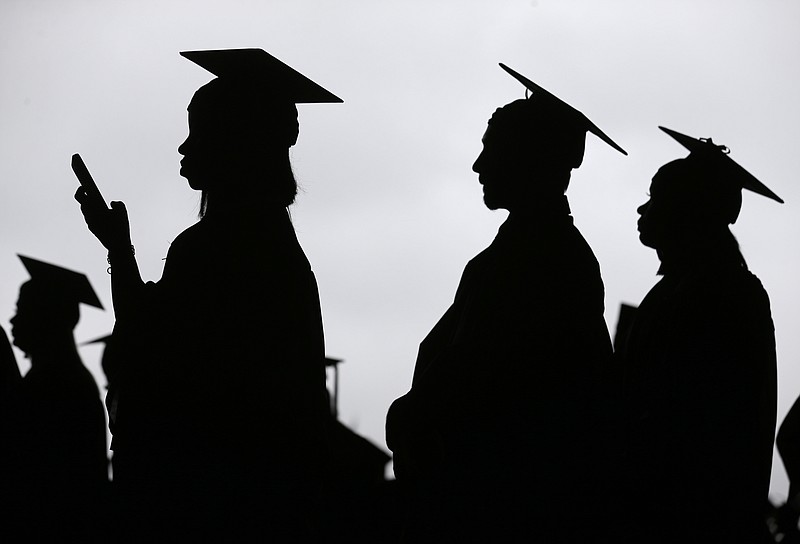With the economy teetering on the brink of a recession, President Joe Biden is expected to announce his decision about student loans as early as this week.
He, at a minimum, must decide whether to extend the pause on federal student loan repayments for some 40 million borrowers by Aug. 31. Initially paused under President Donald Trump in 2020 during the early weeks of the COVID-19 pandemic, it has been extended six times.
If Biden allows the pause to expire, student loan repayments would be expected to begin within weeks.
If he extends the pause -- conveniently until after the midterm election where borrowers might want to thank him with their votes for his fellow Democrats -- repayments might not be expected until after the first of the year.
But Biden is also pondering forgiving some $10,000 of student loans for all federal student loan borrowers, and it only would make sense for him to make that announcement in conjunction with whatever decision he'll make on the pause.
So the issue is certainly on his front burner.
Tennesseans -- 862,000 of them -- owe $31.4 billion in student loans, with the average borrower on the tab for $36,418, according to a 2022 survey by educationdata.org. The total amount ties for the 14th highest amount among the 50 states and Washington, D.C., with the per-borrower amount 17th in the U.S.
According to the survey, about 12.5% of the state's residents have some amount of student debt. Two percent owe more than $200,000, but 15.8% owe less than $5,000. A big chunk of the borrowers, 21.4%, owe between $20,000 and $40,000, those averaging about $28,626.
We happened to talk to two people who had student debt in recent days. In their mid- to late-30s, they both work, live in an apartment and have no children. Their choice of living in an apartment and having no children, they intimated, was due to their student loans.
Loan forgiveness, they said, would be a big help.
We see that. Forgiven $10,000 apiece -- if they owe that much and if their loans are federal -- they might have a better opportunity to buy a home or afford a child. Multiply that by many millions, and you have have an economy that would feel quite stimulated, thank you.
Of course, the total amount that would be forgiven is taxpayer money. It is not paid for by taxing the rich, the corporations or the oil companies that Democrats would love to pay for all of their spending schemes. It's money that was paid by the federal government out of its treasury to colleges but money that with the forgiveness would never be repaid.
And talk about picking winners. Millions who took out student loans and paid back every dime wouldn't be covered. Parents who paid for their children's college out of their hard-earned savings wouldn't see a penny. Those of us who paid for college by working also wouldn't see a thing.
But it certainly would have an effect, a detrimental effect, on the economy, according to financial experts. And it would wipe out some of the benefits of the just-signed Inflation Reduction Act. That is, it would if you believe the measure -- based on budget gimmickry and fuzzy numbers -- will have any affect on the debt or inflation.
An analysis from the Committee for a Responsible Federal Budget found that just extending the pause would cost $20 billion, negating the deficit reduction the Biden administration expects from the first six years of the act.
On the other hand, if the president forgave $10,000 per borrower for households that earned less than $300,000, the cost would be $230 billion, enough to wipe out nearly 10 years of the $305 billion in deficit reduction the administration says its plan would bring about through 2031.
As to inflation, despite Biden's claims of the Inflation Reduction Act actually reducing inflation, an analysis from the Penn Wharton Budget Model found the act's effect on inflation would be "statistically indistinguishable from zero."
An additional one-year pause in the repayment of federal student loans, according to the Committee for the Responsible Federal Budget, would increase inflation 0.2%. Canceling the $10,000 per borrower, the analysis said, would add another .15% up front and more over time since the money that would have returned the government will instead be spent on goods and services.
Recall, if you will, the pause in student loans was made as a pandemic relief effort. Now that the borrowers have become used to not paying back the money, the administration is spinning talk of an extended pause or loan forgiveness as not wanting to further burden the beleaguered former students.
Where have we heard such spinning before? That American Rescue Plan, that's where.
In 2021, the American Rescue Plan was passed by the Democratic Congress ostensibly to help cities and counties deal with the pandemic. But that money is now being spent on a panoply of needs that have nothing whatsoever to do with the pandemic.
So, with just a week before the Aug 31 deadline, former student borrowers are crossing their fingers to hear good news. Meanwhile, most taxpayers are crossing their fingers in hopes of a different outcome.
